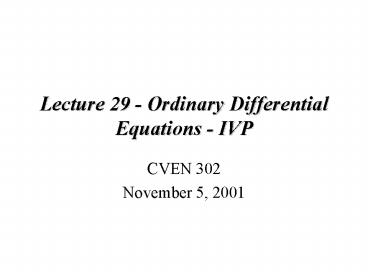Lecture 29 Ordinary Differential Equations IVP - PowerPoint PPT Presentation
1 / 32
Title:
Lecture 29 Ordinary Differential Equations IVP
Description:
The step sizes are: The next step would be: One Step Method. Euler Method ... These methods allow us to vary the step size. Use only one initial value ... – PowerPoint PPT presentation
Number of Views:1013
Avg rating:3.0/5.0
Title: Lecture 29 Ordinary Differential Equations IVP
1
Lecture 29 - Ordinary Differential Equations -
IVP
- CVEN 302
- November 5, 2001
2
Lectures Goals
ODE Methods
- Runge-Kutta Method
3
Runge-Kutta Methods
Runge-Kutta methods are very popular because of
their good efficiency and are used in most
computer programs for differential equations.
They are single-step methods, as the Euler
methods.
4
Runge-Kutta Methods
To convey some idea of how the Runge-Kutta is
developed, lets look at the derivation of the
2nd order. Two estimates
5
Runge-Kutta Methods
The initial conditions are The Taylor series
expansion
6
Runge-Kutta Methods
Expand the derivatives The Taylor series
expansion becomes
7
Runge-Kutta Methods
From the Runge-Kutta The definition of the
function Expand the next step
8
Runge-Kutta Methods
From the Runge-Kutta Compare with the Taylor
series
4 unknowns
9
Runge-Kutta Methods
The Taylor series coefficients (3 equations/4
unknowns) If you select a as If you select
a as Note These coefficient would result in a
modified Euler or Midpoint Method
10
Runge-Kutta Method (2nd Order) Example
Consider Exact
Solution The initial condition is The step
size is Use the coefficients
11
Runge-Kutta Method (2nd Order) Example
The values are
12
Runge-Kutta Method (2nd Order) Example
The values are equivalent of Modified Euler
13
Runge-Kutta Method (2nd Order) Example b
The values are
14
Runge-Kutta Method (2nd Order) Example b
The values are
15
Runge-Kutta Methods
The Runge-Kutta methods are higher order
approximation of the basic forward integration.
These methods provide solutions which are
comparable in accuracy to Taylor series solution
in which higher order derivatives are retained.
It should be noted that the equations are not
need to be linear.
16
Runge-Kutta Methods
17
The 4th order Runge-Kutta
This is a fourth order function that solves an
initial value problems using a four step program
to get an estimate of the Taylor series through
the fourth order. This will result in a local
error of O(Dh5) and a global error of O(Dh4)
18
The 4th order Runge-Kutta
The general form of the equations
19
4th-orderRunge-Kutta Method
f2
f4
f3
f1
xi
xi h/2
xi h
20
Runge-Kutta Method (4th Order) Example
Consider Exact
Solution The initial condition is The step
size is
21
The 4th order Runge-Kutta
The example of a single step
22
Runge-Kutta Method (4th Order) Example
The values for the 4th order Runge-Kutta method
23
Runge-Kutta Method (4th Order) Example
The values are equivalent to those of the exact
solution. If we were to go out to x5. y(5)
-111.4129 (-111.4132) The error is small relative
to the exact solution.
24
Runge-Kutta Method (4th Order) Example
A comparison between the 2nd order and the 4th
order Runge-Kutta methods show a slight
difference.
25
The 4th order Runge-Kutta
Higher order differential equations can be
treated as if they were a set of first-order
equations. Runge-Kutta type forward integration
solutions can be obtain. A more direct solution
can be obtained by repeating the whole process
used in first-order cases.
26
The 4th order Runge-Kutta
The general form of the equations
27
The 4th order Runge-Kutta
The step sizes are
The next step would be
28
One Step Method
Up until this point we have dealt with These
methods are called single step methods, because
they use only the information from the previous
step.
- Euler Method
- Modified Euler/Midpoint
- Runge-Kutta Methods
29
One Step Method
The techniques are defined as
- These methods allow us to vary the step size.
- Use only one initial value
- After each step is completed the past step is
forgotten We do not use this information.
30
Summary
- Taylor Series Expansion
- Euler Method
- Modified Euler Method
- Runge-Kutta Method
- 2nd order Method (Midpoint/Modified Euler)
31
Summary
- 4th order Runge-Kutta Method
- Higher order Runge-Kutta Methods
32
Homework
- Check the Homework webpage































